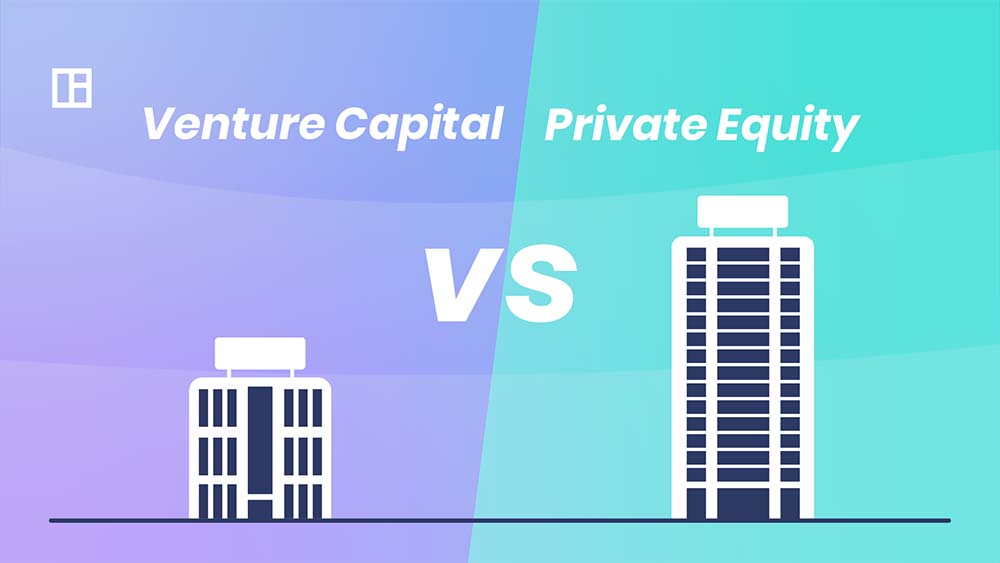Are you an aspiring entrepreneur looking to fund your next big idea? Are you confused about the differences between private equity and venture capital? Don’t worry, you’re not alone- navigating the world of investments can be overwhelming, especially when it comes to these two popular funding options. But fear not, because in this article I’ll break down all the key differences between private equity and venture capital so that you can make informed decisions for your business. So let’s dive in and discover which option is best suited for your entrepreneurial goals!
difference between private equity and venture capital
Private equity and venture capital are two terms that are often used interchangeably, but they actually refer to different types of investment strategies. While both involve investing in companies, there are key differences between the two.
Private equity typically refers to investments made in established companies with a proven track record. These companies may be looking for additional funding to expand their operations or make strategic acquisitions. Private equity firms usually invest large sums of money and take a significant ownership stake in the company.
On the other hand, venture capital focuses on investing in early-stage startups with high growth potential. These companies are often at the idea or prototype stage and require funding to develop their products or services and bring them to market. Venture capitalists provide not only financial support but also mentorship and guidance to help these startups grow.
Another difference between private equity and venture capital is the level of risk involved. Private equity investments tend to be less risky as they are made in more mature companies with an established customer base and revenue stream. In contrast, venture capital investments carry a higher risk due to the uncertainty surrounding young startups.
In terms of exit strategies, private equity firms typically aim for long-term returns through selling their ownership stake after years of growth and development within the company. On the other hand, venture capitalists look for shorter-term gains by either taking their invested funds public through an initial public offering (IPO) or selling their stake when another investor acquires the startup.
Overall, while both private equity and venture capital involve investing in businesses, they differ significantly in terms of target companies, risk levels, investment amounts, time horizons, and exit strategies. Understanding these key differences is crucial for investors looking to enter either market as each offers unique opportunities for growth and return on investment.
Understanding the Basics: What Is Private Equity?
Private equity is a form of investment that involves buying shares in privately owned companies. This type of investment is typically made by high net worth individuals, institutional investors, and private equity firms. Private equity firms are dedicated to raising funds from various sources and using those funds to invest in companies with the goal of generating a high return on their investments.
At its core, private equity involves investing capital into businesses that have the potential for growth and profitability. The main difference between private equity and other forms of traditional investments, such as stocks or bonds, is that it focuses on acquiring ownership stakes in non-publicly traded companies. Private equity investors often play an active role in managing these companies and working closely with management teams to improve operations and increase value.
One key benefit of private equity is the potential for outsized returns compared to other types of investments. By taking a more hands-on approach with the companies they invest in, private equity firms can help drive significant growth and increase overall profitability. However, this also means that there is generally a higher level of risk involved since these investments are not publicly traded and may not have the same level of transparency as publicly traded companies. Additionally, private equity deals typically involve longer holding periods before seeing returns compared to more liquid investments like stocks or mutual funds. Overall, understanding the basics of what private equity entails can help individuals make informed decisions about their investment portfolios.
Delving Into Venture Capital: An Overview
Venture capital is a type of funding for startup companies that have potential for rapid growth and high returns. It’s an essential part of the business world, providing entrepreneurs with the necessary resources to turn their ideas into successful businesses.
One of the main benefits of venture capital is that it allows startups to obtain financing without having to go through traditional banks or other financial institutions. This can be especially beneficial for small businesses or those in emerging industries, as they may not have access to traditional forms of financing. Additionally, venture capitalists often provide more than just financial support; they also offer expertise and guidance in areas like marketing, operations, and strategy.
However, securing venture capital funding is no easy feat. Venture capitalists are highly selective about where they invest their money, as they’re taking on a significant amount of risk by investing in early-stage companies. They carefully evaluate each opportunity based on factors such as market potential, team capabilities, and competitive advantages before deciding whether or not to invest.
Another important aspect of venture capital is its role in driving innovation. By providing funding for unconventional ideas and unproven concepts, it fuels the development of new products and technologies that can transform entire industries. This creates a ripple effect throughout the economy – from job creation to increased consumer spending – making venture capital crucial for economic growth.
In conclusion, while venture capital may seem intimidating at first glance due to its complex nature and high-risk nature, it plays a vital role in fueling entrepreneurship and driving innovation forward. Without it, many groundbreaking companies we know today would never have been able to get off the ground.
Detailed Comparison: Stage of Investment for Private Equity and Venture Capital
Private equity and venture capital are two forms of investment that have gained immense popularity in recent years. While they both involve investing money into companies with the aim of generating returns, there are some key differences between the two.
One major difference between private equity and venture capital is the stage at which they invest. Private equity firms typically invest in established companies that have a track record of success and stable cash flow. These investments are often made to help drive growth or facilitate a change in ownership, such as through a buyout or merger. In contrast, venture capitalists focus on early-stage startups with high potential for growth but limited operating history and revenue. They provide funding to these companies in exchange for an ownership stake, usually taking on higher risks for potentially higher returns.
Another important distinction is the size of the investments made by private equity and venture capital firms. Private equity deals tend to be larger, often involving millions or even billions of dollars, whereas venture capital deals are typically smaller ranging from hundreds of thousands to a few million dollars. This reflects their respective target markets; private equity focuses on mature businesses while venture capitalism targets emerging ventures.
In summary, while both types of investment involve injecting funds into companies for financial gain, private equity tends to target more established businesses while venture capital focuses on early-stage startups with potential for rapid growth. Both forms play crucial roles in driving economic growth and innovation by providing much-needed funding to various industries across different stages of development.
Risk Profile Analysis: How Do Private Equity and Venture Capital Differ?
When it comes to investing, private equity and venture capital are two popular options for individuals looking to diversify their portfolios. While both involve putting money into companies in exchange for ownership stakes, there are significant differences between the two. Understanding these differences is crucial in determining which option may be a better fit for your risk profile.
Private equity typically involves larger investments in more established companies. These firms often use leverage and strategic management techniques to improve the financial performance of the company before selling it for a profit. This usually means longer investment time horizons, with returns expected after 5-7 years or more. On the other hand, venture capital focuses on providing early-stage funding to startups with high growth potential. This type of investment tends to be riskier as startups have a higher chance of failure but also offers potentially higher returns if successful.
For someone with a lower risk tolerance, private equity may be a more suitable option as it involves investing in established companies rather than unproven startups. However, this also means that returns may not be as high compared to those from successful ventures backed by venture capital funds. For individuals seeking higher-risk investments with potentially greater rewards, venture capital may be an attractive choice.
In summary, private equity and venture capital have distinct differences that can greatly impact an individual’s risk profile analysis when considering investment options. Private equity offers stability but potentially lower returns while venture capital carries more risks but also has the potential for larger profits. Ultimately, understanding these nuances is crucial in making informed decisions about where to allocate one’s resources when venturing into these types of investments.
Exit Strategies in Private Equity vs. Venture Capital
Exit strategies are a crucial aspect of both private equity and venture capital investments. These strategies refer to the ways in which investors plan to exit their investments and receive a return on their initial investment. However, while both private equity and venture capital involve investing in companies, their approaches to exit strategies differ significantly.
In private equity, the most common exit strategy is through an initial public offering (IPO). This involves taking a company that was previously privately owned and making it available for public trading on the stock market. This allows investors to sell their shares at a higher price than when they initially invested, thus generating significant returns. However, IPOs can be challenging as they require extensive preparation, regulatory approvals, and market conditions must be favorable. Another common exit strategy in private equity is through mergers or acquisitions. Private equity firms may acquire another company or merge with another company to create a larger entity that can then go public or be sold at a premium price.
On the other hand, venture capitalists typically seek exits through acquisition by larger companies rather than IPOs due to the nature of early-stage startups being riskier and less attractive for public investment. Venture capitalists also often use buyback rights as an exit strategy where they give themselves the option to buy back shares from founders at specific thresholds if certain milestones are not met within a set timeframe. Other options include secondary offerings where additional shares of stock are offered after an IPO has already taken place.
Overall, while both private equity and venture capital rely on lucrative exits for high returns on investment, their strategies vary based on factors such as risk tolerance levels and stage of investment. Understanding these differences is essential for successful investments in either industry.
Conclusion: Choosing Between Private Equity and Venture Capital for Your Business
When it comes to funding your business, there are many options available. Two popular choices for entrepreneurs looking for investment are private equity and venture capital. While both types of financing involve investing in a company with the goal of generating a return on that investment, there are key differences between the two that should be considered before making a decision.
Private equity refers to funds invested in companies that are not publicly traded. This type of financing is typically used by established businesses looking to expand or restructure their operations. Private equity investors often take a more hands-on approach and may require some level of control over the company’s decisions and operations in exchange for their investment. They also tend to invest larger amounts of money compared to venture capitalists.
On the other hand, venture capital is typically used by startups or early-stage companies with high growth potential. These investments come from firms or individual investors who believe in the potential success of the company but also understand that there is higher risk involved. Unlike private equity investors, venture capitalists often have less control over the company’s decisions and instead focus on providing support and guidance as mentors.
Ultimately, choosing between private equity and venture capital will depend on your specific business needs and goals. If you have an established business seeking significant growth or restructuring opportunities, private equity may be a better fit due to its larger funding capabilities and potential for increased involvement from investors. However, if you have an innovative startup with high growth potential but limited resources, then venture capital may be a more suitable option.
No matter which route you choose, it’s important to carefully consider all aspects before making any decisions about financing your business with either private equity or venture capital. Both can provide valuable opportunities for growth and success, so take time to research and weigh your options before proceeding down either path.






